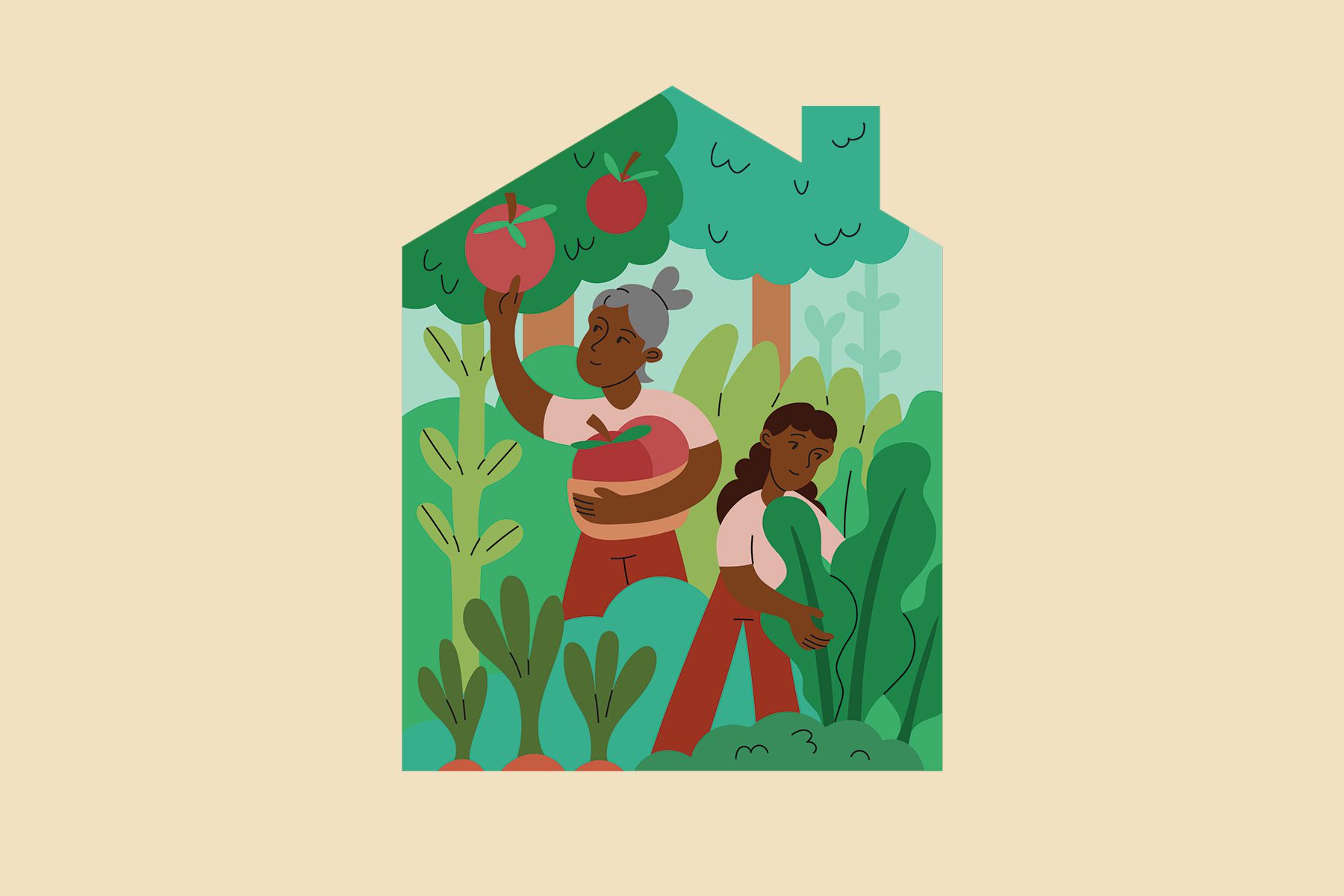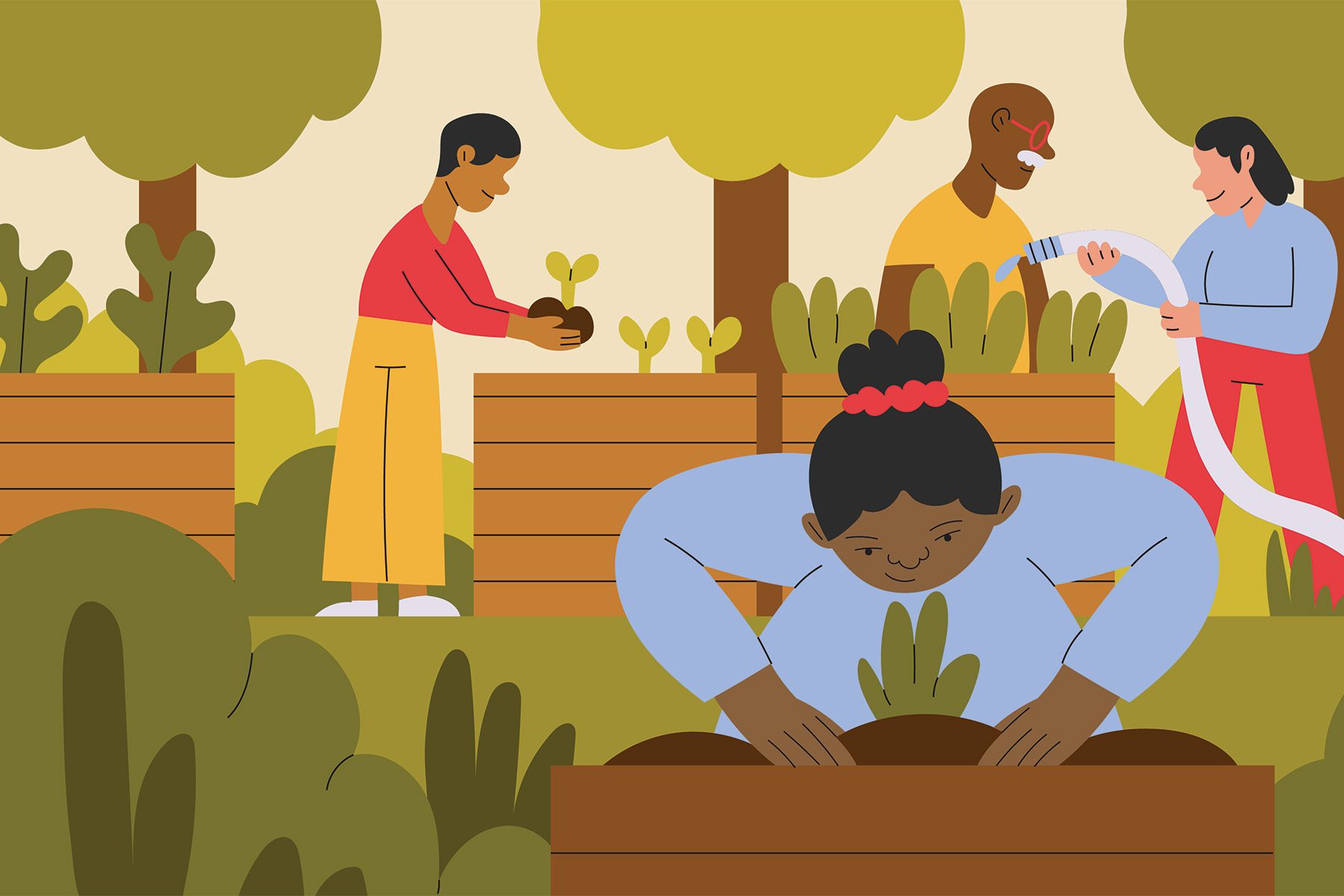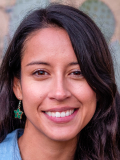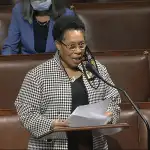We’re telling the untold stories of women, women of color and LGBTQ+ people. Sign up for our daily newsletter.
Sommer Sibilly-Brown didn’t set out to join the food sovereignty movement. The movement found her.
In 2012, Sibilly-Brown was working as an elementary school teacher in St. Croix, part of the U.S. Virgin Islands, when her students presented an idea at an agriculture fair to bring locally grown food to their schools.
Through working on their presentation, the students learned of a national initiative that could do just that. It’s called the National Farm to School Network, and it’s a nonprofit organization that works to connect local farms with school cafeterias — a model that both bolsters local food systems and provides healthier school lunches for kids — a win-win for farmers and their communities.
But the network didn’t reach the U.S. Virgin Islands, and Sibilly-Brown remembers one of her students asking: If the program was national, why didn’t it reach their territory?
“That question has been the question that has driven my work,” Sibilly-Brown said. “If we are the United States, why not here?”
It set her on a path to find answers and solutions to an important problem — an over-reliance on imported foods. She wanted her students to be able to eat food grown nearby and for the U.S. Virgin Islands to achieve a level of food sovereignty, or the ability to produce healthy and culturally relevant food on the islands.
-
More environment & climate coverage
- How the future of sustainable fashion is rooted in the fight for garment worker protections in Los Angeles
- A mother-daughter duo wants healthy environments to be guaranteed in state constitutions
- Principal historian Turkiya Lowe is reshaping how the National Park Service tells the American story
Sibilly-Brown is not alone in her desire to see local food systems grow. Across U.S. island territories, women are forming connections with one another and working to ensure that their communities can be resilient in the face of climate change and future pandemics.
In Guam, one of the few places where matrilineal traditions still run strong, women are empowered to make the decisions that lead their communities and their homes. And in Puerto Rico, women have been at the forefront of the community-building aspects of the local food system.
The same is true of the Virgin Islands, where Sibilly-Brown said she mostly encounters women in the food systems work she’s been doing. “I absolutely think this is a women’s movement,” she said.
“It comes from things as spiritual and inherent as childbearing where that seed becomes a baby, Or making something out of nothing in the kitchen that is delicious for our families,” she said. “We harness the power of transformation really, really well, and I see it daily within the food system.”
While these territories are technically a part of the United States, Sibilly-Brown says it is more accurate to think of them as possessions. They share a particular kind of invisibility, viewed as strategic military locations and vacation destinations, but overlooked when it comes to supporting their local economies.
This is particularly true in the context of food and sustainability. Currently, the U.S. Virgin Islands imports between 95 and 99 percent of its food from the U.S. and other countries. Other island territories have similarly high rates, with Guam at around 90 percent and Puerto Rico at 85 percent.
Growing the local food system is one way in which territories can address vulnerabilities caused by importing food. Climate change has fueled more intense hurricane seasons, which affect shipping; supply-chain issues caused by the pandemic showed the need to have more local production. Furthermore, a prevalence in health problems like diabetes, caused in part by the highly processed foods being brought to the islands, has illustrated a need to reconnect with traditionally grown fruits and vegetables.
So Sibilly-Brown and her students got to work on a year-long service learning project to bring local food back into the school cafeteria. She began to see important ways in which the islands and the United States mainland were disconnected — and still are.
“I realized that there was this big gap of knowledge between all of these different actors in the system,” she said. Some of the people she has to work with through the United States Department of Agriculture (USDA) are based in Virginia and Florida, for example. “I sought to become the bridge that could connect people, just like a pollinator, buzzing around the place and talking about food systems.”
After successfully integrating the U.S. Virgin Islands into the National Farm to School Network, she started a nonprofit, called the Virgin Islands Good Food Coalition, to support and advocate for policies and funds that support farmers on the Virgin Islands.

In Puerto Rico, Crystal Díaz has taken a similar approach, looking for ways to strengthen and support local food production by connecting farmers with consumers.
The devastation wrought by Hurricane María in 2017 illustrated the need to bolster the local food systems. The main port that sends food to Puerto Rico is in Florida, and it, too, was damaged by the storm. “Hurricane Maria was a slap in the face for everybody,” said Díaz, who recently spoke on a forum with Brown about food sovereignty on U.S. territories. It was then that many people realized the extent of their reliance on boats to bring in the food. “Supermarkets started to have their aisles empty. That was a wakeup call for a lot of people,” she said.
Through an app she co-founded in 2018 called PRoduce, restaurants and residents are now able to order local produce directly from small farmers on the island. So far, the app has been able to link 400 producers with over 70,000 consumers.
She sees food security as one way to build resiliency against future storms and says the type of agricultural practices farmers utilize will be important too.
“We need to do it in a resilient, sustainable way, using soil conservation practices, agroecology and sustainable farming practices that then allow us to be resilient towards climate change,” she said. “Hurricanes are going to continue to hit the island, and they are going to get stronger, apparently, because of climate change.”
For Ursula Herrera, who works at the Guam Department of Agriculture, food sovereignty isn’t just about surviving climate change but is a tool to reclaim a cultural connection to food that has been eroded by colonialism.
Through her work with the department, Herrera connects local farmers to microgrants from the USDA that are aimed at increasing the quantity and quality of food grown on Guam. Other initiatives include starting up a local food bank supplied with produce by a farmers coop and promoting seed saving.
Herrera, who is CHamoru — an Indigenous person from Guam and the Northern Mariana Islands — said it is also about finding ways to educate the next generation. She takes youth groups on medicinal plant hikes, for example, passing down the knowledge that she learned from her grandmother. “[I point out] the plants that heal us and help us and just reclaiming our cultural identity with the land,” she said.
Before occupation by the Japanese during World War II, where CHamoru people were sent to concentration camps, Herrera said most families in Guam – its Indigenous name is Guåhan [GWAH-hahn] – practiced subsistence farming. “Every house had their own backyard garden,” she said. “We bartered with one another. And then comes the war and the loss of prime agricultural land for the [U.S.] military bases.” The economy also became cash-based.
A lot of her work is about bringing that hyper-local food production back. “We have a nursery, and we have the lowest prices on the island so that we can support our food growth,” she said. “We have all these food crops and fruits, but also, we’re carrying traditional herbal medicine, herbal plants.”
But for this work to continue and grow, places like Guam, Puerto Rico, U.S. Virgin Islands and other U.S. territories need government investment and to be better served by the USDA and the resources it can provide to farmers, Sibilly-Brown said.
In recent years, she’s focused on reaching government officials on the mainland. Most recently, she visited Washington, D.C., in February to raise the visibility of the needs of territories while lawmakers worked on the Farm Bill, a piece of legislation passed every five years that sets national policy on fields such as agriculture, nutrition, conservation and forestry.
“Because we’re isolated geographic areas, there are limits on our representation,” she said. The U.S. Virgin Islands, for example, has one nonvoting delegate in the U.S. House of Representatives but no counterpart in the Senate. Other territories also send someone to the House to represent their voices, but they cannot cast votes on legislation.
So it’s up to grassroots groups to advocate for their own needs.
The first step for Sibilly-Brown and her allies is raising the profile of the territories in the Farm Bill. “We are seeking voice and partnership and visibility among our nation,” she said.
Outside of the microgrants that the USDA has set aside for territories and that max out at $10,000, farmers on the islands are otherwise in a competitive pool for more robust funding with farms on the mainland, where there are more resources and investments already. “How will our proposals ever actually measure up?” Sibilly-Brown wonders, when farmers have less contact with USDA officials and less help putting together applications.
It’s why she’s begun advocating for an Office of Territorial Affairs to be created at the USDA — one that could meet the unique needs of island territories.
She’s not under any illusions that it will be created any time soon. But it’s about planting the seed for what an office might accomplish as a liaison to better serve farmers in isolated territories.
“What I want people to understand is we’re not asking for exceptions because we’re territories; we’re asking for inclusion in what should be afforded to every producer who’s producing in this nation,” she said. “We’re asking them to consider small farms at scale. Like what does scalable hyperlocal farming look like [in order] to add food security and work at the intersections of environment and health that our communities really need?”







